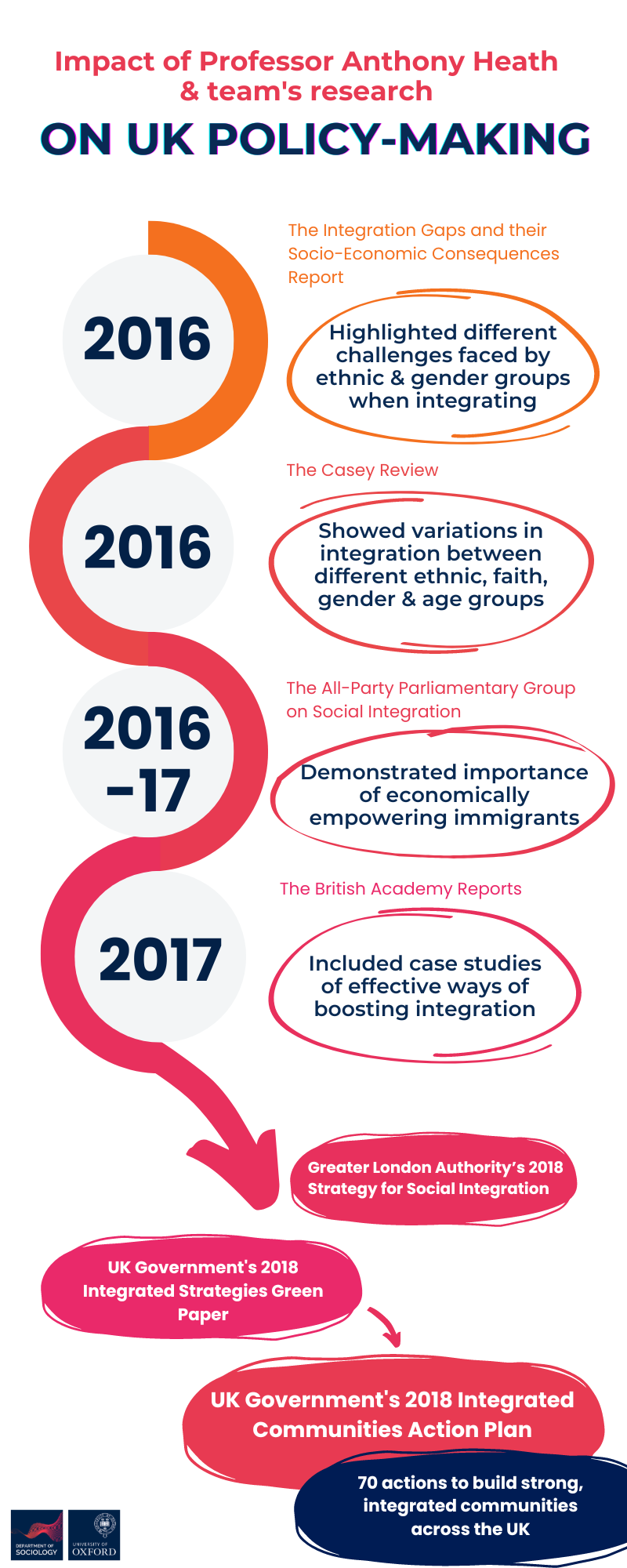The social integration of ethnic minorities in England
Research within the Sociology Department, headed by Professor Anthony Heath, on the social integration of ethnic minorities in Britain has achieved significant influence at government level, impacting policy-making in London and across the country.
The research is the work of the Centre for Social Investigation, which aims to address contemporary social issues by engaging directly with both policy-makers and the public.
Following a longstanding research interest in social inequality, Emeritus Professor Heath set up the Centre for Social Investigation at Nuffield College in 2014. Now directed by Professor David Kirk, the CSI takes a multidimensional approach to the study of social integration, looking at structural, social and political factors and exploring the drivers of integration.
Research led by Professor Heath showed that minorities, especially the children of non-white immigrants, experience a range of disadvantages, both in education and the labour market. The studies revealed that minorities experience ‘ethnic penalties’ (a concept introduced by Professor Heath and now standard currency in academic and policy research).
A particular area of disadvantage is unemployment, with minorities being unable to translate educational successes into success in finding work.
Further research into employer discrimination indicated a persisting discrimination with a strong racial character - discrimination against white minorities being relatively modest while that against minorities of a Black Caribbean, Black African or Pakistani background was much more substantial. The results showed that levels of discrimination were unchanged since similar studies were undertaken in the 1960s.
Professor Heath commented to the Guardian newspaper:
The absence of any real decline in discrimination against black British and people of Pakistani background is a disturbing finding which calls into question the effectiveness of previous policies. Ethnic inequality remains a burning injustice and there needs to be a radical rethink about how to tackle it.
Professor Heath's team, including Professor Stephen Fisher, also undertook research that showed that perceptions of how one is treated by mainstream institutions are major drivers of integration. Feeling that one’s group is a victim of discriminatory treatment was found to be a more powerful driver of non-electoral political action, and of the retention of an ethnic identity, than the perception that one has been a victim individually.
This research was a major influence on the government’s Social Integration Strategy, as laid out in its 2018 Integrated Communities Strategy Paper and the subsequent Integrated Communities Action Plan.
The Action Plan, published in 2019, sets out the government’s next steps for building strong, integrated communities, including 70 actions to promote integration, and with the potential to improve the social and economic opportunities for people of all ethnic minorities living in England.
Professor Heath and his team's research has made an impact within numerous key government reviews and reports:
1. The Integration Gaps and their Socio-Economic Consequences Report (2016), co-authored by Professor Heath, highlighted the different nature of the integration gaps faced by different ethnic and gender groups, especially the different but severe problems faced by Muslim women and by young black men.
2. The Casey Review (2016) used Professor Heath's research to show the variations in socio-economic integration between different ethnic and faith groups, and by age and gender.
3. The All-Party Parliamentary Group on Social Integration (2016–17) included research by Professor Heath and Dr Lindsay Richards that demonstrated the importance of economically empowering immigrants, which has a greater impact on integration than any other policy intervention.
4. The Greater London Authority’s Strategy for Social Integration (2018) drew on previous research to recommend the launch of the English for Speakers of Other Languages (ESOL) Plus programme, which supports Londoners learning English, and the Workforce Integration Network, which aims to improve pathways into employment for underrepresented groups.
5. The British Academy invited Professor Heath to lead their 2017 report(s) on social integration, which received widespread media coverage and included concrete examples of effective interventions to boost social integration.
6. The 2018 Integrated Strategies Green Paper, which was underpinned by the Casey Review, APPG report and the British Academy publications, fed into the government’s Integrated Communities Action Plan. Recommended actions included increasing access to English language learning, strengthening local leadership, and providing better support and information to people who are new to the UK.
One of the main themes of the Action Plan is that integration is a two-way street – ‘local residents share a responsibility to welcome newcomers to their communities, including migrants, and provide the environment and opportunities for them to take part in community life that will enable effective integration’, thus reflecting a key tenet of Professor Heath’s research
Recommendations for better integration, based on the research findings of Professor Heath and his team, have been reflected in real-world action to address inequality. Following the Action Plan, local integration plans were rolled out in five pilot areas - Blackburn with Darwen, Bradford, Peterborough, Walsall and Waltham Forest.
Walsall implemented the Walsall for All programme, funding a number of initiatives, such as the Black Country Impact Project, designed to address high levels of youth unemployment, especially those at risk of social exclusion or from marginalised communities.
Blackburn with Darwen’s Our Community, Our Future programme has a number of projects underway, including a Youth Ambassador’s programme to equip young people with the skills to become leaders in the community, while Peterborough has created a Communities Fund, offering awards to local initiatives that bring together communities, such as a community garden.
-
Heath, A.F, ‘Muslim integration and disadvantage’, in David Feldman and Ben Gidley (eds) 'Integration, Disadvantage and Extremism: Essays arising from a symposium held at the House of Commons.' Oxford: Compas (2013)






